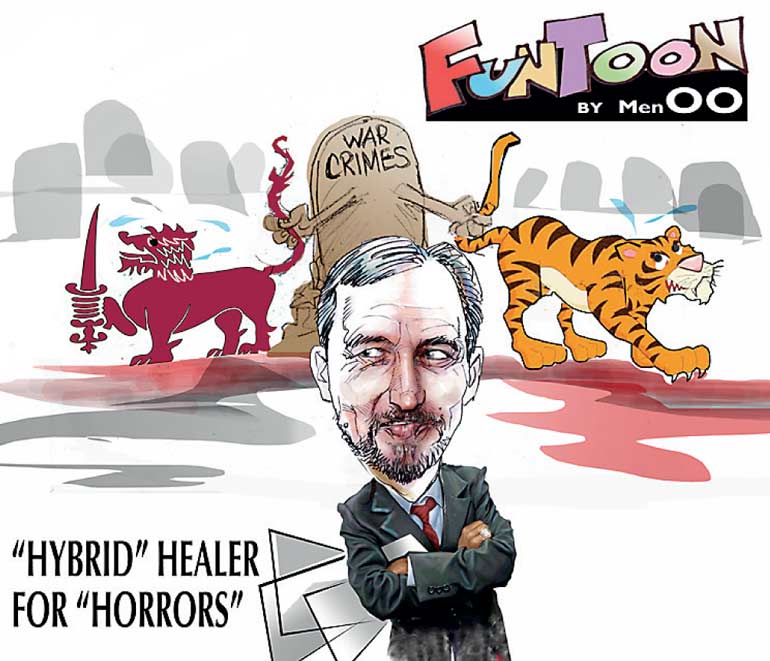Monday Feb 23, 2026
Monday Feb 23, 2026
Friday, 18 September 2015 00:10 - - {{hitsCtrl.values.hits}}

Dharisha Bastians reporting from Geneva
Torture and sexual violence have continued in post-war Sri Lanka, even though a democratic Government is in place, because the dismantling of oppressive structures have not taken place, former member of the UN General Secretary’s Panel of Experts on Sri Lanka and South African lawyer Yasmin Sooka said in Geneva yesterday.
Sooka’s International Truth and Justice Project (ITJP) has documented 180 cases of torture in Sri Lanka since May 2009, including 11 cases reported in 2015 after the new Government took office. The report claims to have obtained Medical Legal Reports confirming injuries and assault consistent with torture and sexual violence, and also identifies 41 sites in Sri Lanka where “victims say they were tortured after the war”. The report also claims to provide GPS coordinates for a “secret naval intelligence detention facility in the Trincomalee Naval Dockyard” and has possession of “names and photographs of torturers and guards who worked there”. The report extensively details conditions and a rough map of the “Joseph Camp” in Vavuniya, as being “a base for military intelligence white van abduction teams” and a site where victims were tortured and sexually abused.
Addressing a side event organised by Human Rights Watch and Freedom from Torture UK during the UN Human Rights Council’s 30th Session, Sooka said the new Government would have to address these cases if it is to live up to the many commitments made by Foreign Minister Mangala Samaraweera to the Council on Monday(14).
“Words are cheap. Unless they are followed up by political commitment and an implementation plan which have been the subject of national consultations, this could become another squandered opportunity,” Sooka, who is also the Executive Director for Foundation for Human Rights South Africa.
Sooka’s presentation at the event included a short film documenting the abuse of two witnesses from Sri Lankans, both male, both from the Tamil community. They described harrowing experiences of physical and sexual assault allegedly at the hands of security forces personnel in 2015, after the new Government took office.
“They put a petrol bag over my head and I lost consciousness,” said one witness abducted in June 2015, five months after the presidential election.
“I spend most of my time in the dark. I feel numb when the light is on,” said a second witness, unnamed for his protection who was allegedly abducted and featured in Sooka’s presentation.
Sooka welcomed the OHCHR Investigation on Sri Lanka report that was made public on Wednesday (16), the “human rights community could celebrate their vindication.” “We have won the first part of the battle. That is the struggle to have the verdict set that during the final phase of the war in Sri Lanka war crimes took place. The report confirms the work of the UN Secretary General’s Panel of Experts of which I was a part and the work of human rights groups,” the former UN expert on Sri Lanka said.
The ITJP strongly recommended security sector reform in order to end the incidence of torture and sexual violence that Sooka said had become “entrenched” in the military.
“The impunity for these crimes are so entrenched that the abductors never cover their faces, only conceal the location at which the torture takes place,” Sooka explained.
Dr Juliet Cohen, Head of Doctors, Medico-Legal Reports Team at Freedom from Torture UK, read a harrowing testimony from a torture victim she had examined, whose abuse had been so extensive he showed long term physical and psychological damage. Dr Cohen said that Freedom from Torture Medico Legal Team had received 800 requests for medical legal reports - typically required in asylum applicants from persons claiming torture and degrading treatment in home countries - from Sri Lankan Tamils. “This is more than any other nationality we get requests from,” Dr. Cohen said during the discussion.
Dr. Cohen said that 100% of cases examined had suffered blunt force trauma while 71% disclosed sexual violence.
She said Freedom from Torture UK had provided this information to the UN probe team whose report was released this week. “I hope that the forensic nature of the evidence proved useful. Our reports were cited in OISL report,” Dr. Cohen said.
Sooka urged civil society to remain engaged over the next week as consultations begin on the draft resolution on Sri Lanka to be tabled at the end of the current UNHRC session. “Make your voices heard,” she urged.
“The success of any transitional justice mechanism is not measured by the stories a Government tells, but by the stories victims tell,” she said.